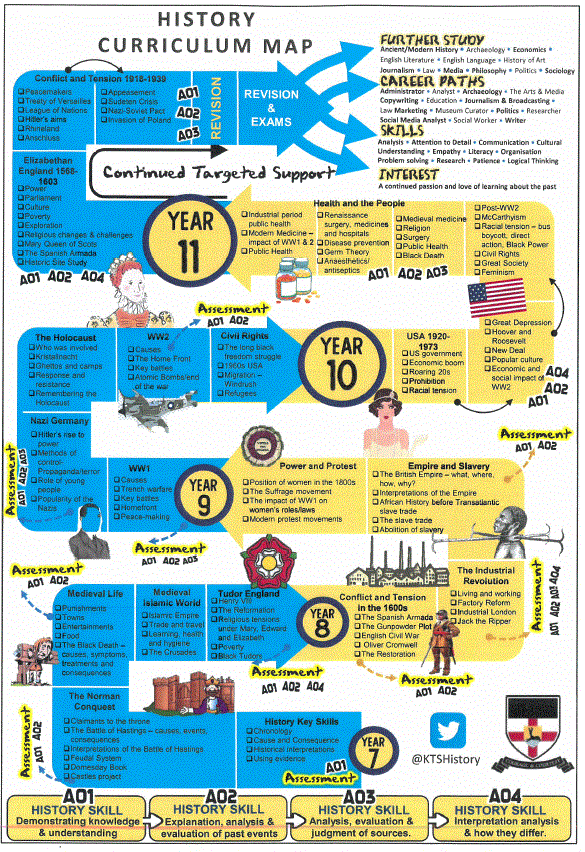Mathematics - Year 7
Click here to return to our History curriculum home page
Below you will find more specific information about the curriculum in History for Year 7 students, explaining to you what students will learn, when, why and how. There is also information about how parents/carers are able to support students in their learning, extra-curricular opportunities in this subject and how it links to other subjects and the wider world.
|
Subject Key Concepts #1 Cause and Consequence#2 Change and Continuity#3 Evaluating Evidence/Interpretations#4 Making supported judgements#5 Historical perspective –
|

Please click here for PDF History Learning Journey |
Curriculum Overview for the year
|
Useful documents:
Please click here for a PDF of curriculum overview.
While this information covers a broad range of areas, please do get in touch with the Subject Leader Mrs Robertson if you have any questions.
Please click on the questions below to find out more.
How are groups organised?
We organise the classes by mixed ability. All classes have three hours of History per fortnight.
What characteristics does a successful student have in this subject?
The most successful students in this subject will have an interest in how society, politics and the economy has changed over time and will be comfortable with analysing different interpretations of the past. Successful students will also have the ability to form rational arguments, supported with evidence, whilst they will also be able to write at length.
How will students learn at this level?
- Collaborative learning where you work with your peers
- Close reading and note-taking
- Using the internet to support your learning
- Using quizlet to support and test your learning
- Independent learning where you are responsible for your own progress
- Regularly self-assessing work and improving on it
How will students’ learning be assessed at this level?
There is one formal, summative assessment per carousel, as well as a factual knowledge test in term 1 as follows:
Factual knowledge test on History Key Skills
Written assessments on:
- Why did William win the Battle of Hastings (cause and consequence)
- How much life change following the Black Death (change and continuity)
- Was Henry VIII a good or bad King (interpretations/judgement)
In day to day lessons, there will opportunities for self and peer assessment and your teacher will complete a ‘book look’ every half term to monitor your exercise book.
When do key assessments take place?
Key skills assessment will be just before October half term. Assessments1 will be at the end of the Autumn term. Assessment 2 will be just after February half term. Assessment 3 will be just after Easter.
How can parents/carers support students’ learning?
- Encourage your child to re-visit their classwork at home and help them test their understanding of that information – e.g through quizzing them on key names/dates/events
- Encourage your child to watch relevant programmes about our topics on TV/online – there are lots of programmes on BBC iPlayer as well as Youtube.
- Encourage your child to access information on the internet as a way of enriching and consolidating their knowledge – e.g through using the BBC Bitesize website.
- Encourage your child to spend quality time on their homework and provide a suitable space for them to complete it.
- Check the quality of the work in your child’s exercise book and encourage them to make improvements where possible.
What equipment do students need for this subject?
- Essential basic equipment – pen, pencil, ruler, exercise book etc.
- Access to SMHW
- Access to Quizlet
How does this subject link to other subjects?
- English and other Humanities subjects: Literacy, communication, evaluation, analysis and argument
- Philosophy: Religious changes in the Tudor period
What websites or resources may be helpful to support students’ learning?
BBC Bitesize - https://www.bbc.co.uk/bitesize/subjects/zk26n39
Quizlet - https://quizlet.com/join/98D93fadN
What extra-curricular or enrichment opportunities are available for students in this subject at this level?
The whole year group will go on a curriculum trip to Warwick Castle in the Summer term.
What sort of careers can this subject lead to?
History can lead to a hugely wide range of careers:
- Law
- Teaching
- Museums and art gallery curatorship
- Research
- Finance
- Politics
- Media and marketing
- Public relations
- International relations
- Journalism
The most traditional route into many of these careers is to undertake a History degree at university, before doing a conversion or post-graduate qualification in a slightly different discipline (a law conversion or a PGCE for example). Having completed a History degree also opens opportunities for accessing internships in areas such as marketing, public relations or journalism
What does student work look like in this subject at this level?
Please see our History Department Twitter page for some examples of student work https://twitter.com/ktshistory
How does this subject support a broad and balanced curriculum, meeting the needs of all students, and developing traditional core skills?
As a subject, History provides students with regular opportunities to make links between their learning across different subjects. History allows students to connect their learning about the past with developments and events in the present day, whilst the range of topics covered allows students to take in economic, social, political and religious history across a vast time period, going from the ancient Romans and Greeks up to the present day. Students study a combination of British and wider world History, ensuring that a range of experiences are covered. In terms of developing core skills, History students will regularly utilise and hone their analytical and evaluative skills, through exploring different interpretations of the past and building their contextual knowledge to reach their own judgements and conclusions. Students also regularly complete longer pieces of writing, giving them opportunities to develop essay-writing skills and develop their use of subject specific key terms, whilst also practicing their general spelling, grammar and punctuation.
How does this subject promote creativity, critical thinking, practice, perseverance and resilience, and making links?
History at KTS includes a range of activities aimed at getting students to utilise their creativity to help them to learn a vast amount of contextual knowledge; students are regularly given a choice of how to complete tasks and record notes, allowing them to create their own resources, whilst students are regularly given opportunities to work collaboratively and create responses as a group. Critical thinking is integral to History and analytical and evaluative skills are central to completing tasks and assessments. In terms of resilience, students are routinely expected to complete difficult tasks and all students are encouraged to be aspirational and ambitious. As we cover such a huge range of history and students are regularly required to make links between different developments and time periods.
How does this subject encourage enrichment and the development of cultural capital, deep learning, and inclusivity?
Students cover a range of topics, allowing them to dip into the social, religious, political, cultural and economic changes over time in Britain but also elsewhere.
The students also have the opportunity to visit Warwick Castle, which is an opportunity for them to bring what they’ve been studying to life (all Year 7 students attend and support is available with payment etc).






